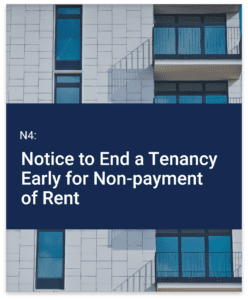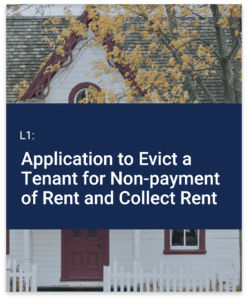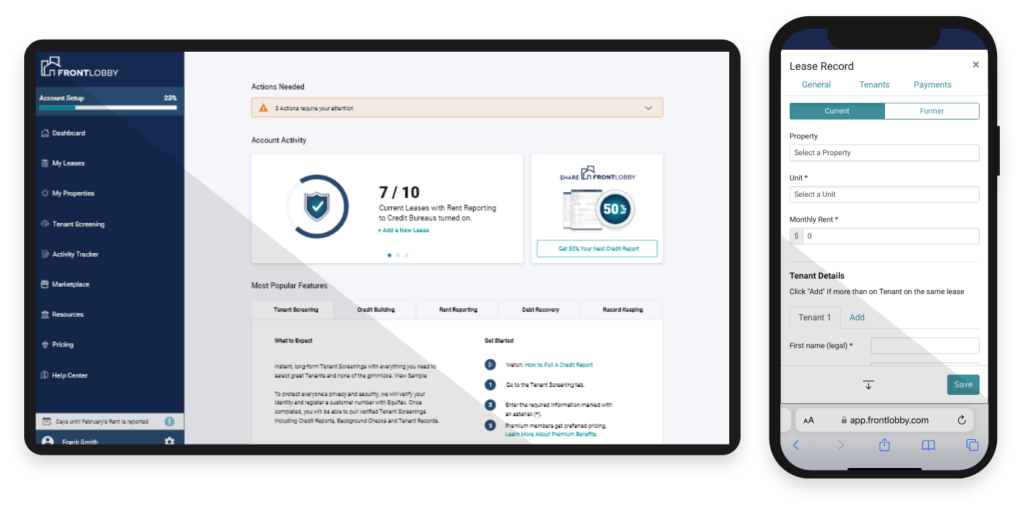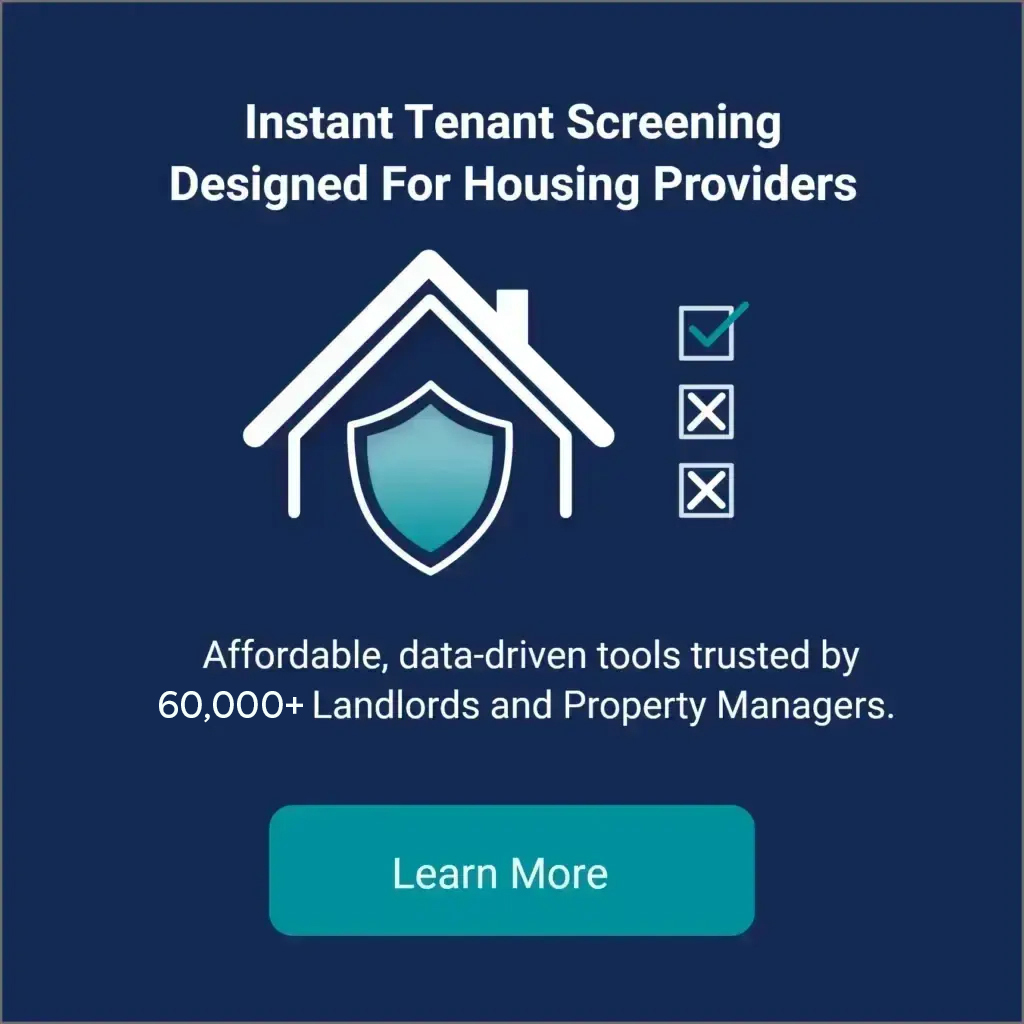How to Evict a Tenant for Non Payment of Rent in Canada
A Guide to Legally Evicting a Tenant Not Paying Rent
- FrontLobby
- Published
- Updated March 10, 2025

Table of Contents
When to Evict a Tenant Not Paying Rent?
How to Evict a Tenant Not Paying Rent in Canada?
Steps to Follow When Evicting a Tenant for Unpaid Rent
How to Evict a Tenant for Non-payment of Rent in Ontario?
Inform the Credit Bureaus of Unpaid Rent
Reporting Unpaid Rent After an Eviction
The Financial Strain of Late or Unpaid Rent
When to Evict a Tenant Not Paying Rent
Although evicting a Tenant is typically a last resort, it can become unavoidable in specific scenarios, especially when dealing with a Tenant not paying rent. According to a recent survey, 10% of rental agreements end in a Tenant eviction. As a result, many landlords and property managers have had no choice but to experience the stress associated with eviction proceedings – both emotionally and financially.
The Average Eviction Costs
a Housing Provider $11,000
How to Evict a Tenant Not Paying Rent in Canada
Evicting a Tenant not paying rent in Canada can be a challenging process, as landlords must navigate strict regulations and adhere to local tenancy laws. Each province and territory has its own rules, requiring landlords to follow specific procedures to ensure the eviction is legal and fair. The list below is a general guide for evicting a Tenant not paying rent, but it’s essential to consult the laws in the Tenant’s location to ensure compliance.
Steps to follow when Evicting a Tenant for Unpaid Rent
Patience, attention to detail, and proper documentation are key to successfully navigating the eviction process.
- Review Local Tenancy Laws and Regulations: Familiarize yourself with the specific Landlord-Tenant laws in your province or territory, as procedures and requirements vary across Canada. For instance, British Columbia’s Residential Tenancy Branch provides detailed guidelines for Landlords.
- Provide the Tenant with a Formal Notice of Non-Payment: If rent is overdue, issue a written notice to the Tenant specifying the amount owed and the deadline for payment. The notice must comply with local regulations regarding format and delivery. In Ontario, Landlords use the N4 form for this purpose.
- Allow the Tenant a Specified Period to Pay the Overdue Rent or Vacate: After serving the notice, Tenants are typically given a set period to pay the outstanding rent or move out. This timeframe varies by jurisdiction; for example, in British Columbia, Tenants have five days to pay the rent or dispute the notice. In Alberta, under the Residential Tenancies Act, Tenants who receive a 14-Day Notice to Terminate Tenancy for non-payment of rent have until the end of the 14-day period to pay the overdue rent or vacate the property. If they pay in full within this timeframe, the notice becomes void, and the tenancy continues.
- File an Application with the Appropriate Rental Tribunal or Board: If a Tenant fails to pay overdue rent or vacate within the specified period, Landlords can apply to their local rental authority for a hearing. Each Canadian province and territory has its own governing body for residential tenancy disputes:
British Columbia: Residential Tenancy Branch (RTB) – https://www2.gov.bc.ca/gov/content/housing-tenancy/residential-tenancies
Alberta: Residential Tenancy Dispute Resolution Service (RTDRS) – https://www.alberta.ca/residential-tenancy-dispute-resolution-service.aspx
Saskatchewan: Office of Residential Tenancies (ORT) – https://www.saskatchewan.ca/ortManitoba: Residential Tenancies Branch – https://www.gov.mb.ca/cca/rtb/
Ontario: Landlord and Tenant Board (LTB) – https://tribunalsontario.ca/ltb/
Québec: Tribunal administratif du logement – https://www.tal.gouv.qc.ca/en
New Brunswick: Residential Tenancies Tribunal – https://www2.gnb.ca/content/gnb/en/corporate/promo/renting-in-new-brunswick/evictions.html#:~:text=A%20landlord%20may%20apply%20for%20an%20eviction%20by%20completing%20a,the%20tenant%20with%20the%20application.
Nova Scotia: Residential Tenancies Program – https://novascotia.ca/sns/access/land/residential-tenancies.asp
Prince Edward Island: Island Regulatory and Appeals Commission (IRAC) – https://www.irac.pe.ca/rental/
Newfoundland and Labrador: Residential Tenancies Office – https://www.gov.nl.ca/dgsnl/residential-tenancies/
Yukon: Residential Tenancies Office – https://yukon.ca/en/resolve-landlord-or-tenant-dispute
Northwest Territories: Rental Office – https://www.justice.gov.nt.ca/en/rental-office/
Nunavut: Office of the Rental Officer – https://www.gov.nu.ca/family-services/information/rental-office
- Attend a Hearing if Required: Participate in the scheduled hearing to present your case for eviction. Ensure you have all necessary documentation, such as the lease agreement, payment records, and copies of notices served.
To ensure the hearing goes smoothly and your case is presented effectively, consider the following tips:- Prepare Thoroughly: Bring all necessary documentation, including the lease agreement, payment records, copies of notices, and any communication with the Tenant regarding the issue.
- Be Professional: Present your case calmly and respectfully, focusing on facts and avoiding emotional arguments.
- Know the Rules: Familiarize yourself with the hearing process for your local tribunal or board, including how evidence is presented and what to expect during the hearing.
- Consider Legal Representation: While not always required, having a lawyer or paralegal familiar with tenancy law can help you navigate the process and strengthen your case.
- Understand Possible Outcomes: Be aware that the board or tribunal may offer alternative resolutions, such as payment plans, instead of eviction.
- Obtain an Eviction Order if Approved: If the tribunal or board rules in your favour, you’ll receive an eviction order specifying when the Tenant must vacate the property. It’s crucial to follow the legal process and not attempt to evict the Tenant without this order.
Once the Tenant eviction order is granted, carefully review the terms to understand the timeline and any conditions the Tenant must meet. Make sure to follow the instructions provided by the tribunal or board, as taking any action outside of the order can result in legal consequences. Keep a copy of the eviction order for your records, as it may be required for enforcement or future disputes. - Hire a Sheriff or Enforcement Officer to Carry Out the Eviction if Necessary: If the Tenant does not leave by the date specified in the eviction order, you may need to engage a sheriff or authorized enforcement officer to enforce the eviction. Self-help evictions are illegal in Canada; only authorized personnel can remove a Tenant.
To ensure the Tenant eviction is carried out legally and smoothly, keep these key considerations in mind:- Follow Proper Procedures: Once the eviction order is issued, contact the sheriff or authorized enforcement officer to schedule the eviction. Only they are legally allowed to enforce the order.
- Prepare the Property: Be present on the day of the eviction to ensure access to the property is granted and any Tenant belongings left behind are handled according to local laws.
- Understand Tenant Property Rules: Some provinces require Landlords to store or handle abandoned Tenant belongings for a certain period, while others allow immediate disposal. Check local regulations to avoid liability.
- Maintain Documentation: Keep a record of the eviction process, including any communication with the enforcement officer and details of the Tenant’s departure, in case issues arise later.
While the general steps for evicting a Tenant in Canada provide a useful framework, each province has its own specific regulations and processes. Let’s take a closer look at how eviction for non-payment of rent is handled in Ontario under the Residential Tenancies Act.
How to Evict a Tenant for Non-payment of Rent in Ontario
In Ontario if a Tenant chooses to not pay rent in Ontario, there are a series of steps, each requiring specific forms and adherence to legal procedures:
Serve the N4 Notice: If a Tenant fails to pay rent on the due date, the Landlord can issue a Notice to End a Tenancy Early for Non-payment of Rent (Form N4). This notice informs the Tenant of the amount owed and provides a deadline to pay the arrears or vacate the unit. The termination date must be at least 14 days after the notice is given for monthly tenancies, or 7 days for daily or weekly tenancies.

We have provided a quick download for the current Ontario N4 form. To obtain the most recent copy, you can visit Tribunals Ontario.
2. Wait for the Tenant’s Response: After serving the N4 notice, the Tenant has until the termination date to pay the overdue rent in full. If the Tenant pays all arrears before the Landlord files an application with the Landlord and Tenant Board (LTB), the notice becomes void, and the tenancy continues.
3. File an L1 Application: If the Tenant neither pays the overdue rent nor vacates by the termination date, the Landlord can file an Application to Evict a Tenant for Non-payment of Rent and to Collect Rent the Tenant Owes (Form L1) with the LTB. This application can be submitted online through the Tribunals Ontario Portal or by mail.

We have provided a quick download for the current Ontario L1 form. To obtain the most recent copy, you can visit Tribunals Ontario.
4. Attend the Hearing: The LTB will schedule a hearing where both Landlord and Tenant can present their cases. It’s essential to bring all relevant documentation, including the lease agreement, payment records, the N4 notice, and proof of service.
5.Obtain the Order: If the LTB rules in favour of the Landlord, it will issue an order specifying when the Tenant must vacate and any amounts owed.
6. Enforce the Eviction: If the Tenant does not vacate by the date specified in the order, the Landlord must obtain a Writ of Possession from the LTB and have it enforced by the Court Enforcement Office (Sheriff). Self-eviction is illegal; only the Sheriff can enforce the eviction order.
7.Report the Unpaid Rent: Landlords can report the unpaid rent to Credit Bureaus through services like FrontLobby. Reporting the debt ensures the Tenant’s rental history reflects their payment behaviour, promoting accountability and potentially motivating repayment. This step supports a more transparent rental market while helping Housing Providers address financial losses.
Inform the Credit Bureaus of Unpaid Rent
Housing Providers dealing with non-payment of rent or frequent late payments are often at risk of initiating evictions, a process that is both time-consuming and costly. Implementing Rent Reporting can help foster accountability by encouraging Tenants to make timely payments. This proactive approach has been shown to significantly reduce delinquencies, offering Housing Providers a practical solution to minimize the need for evictions while maintaining financial stability.
Research indicates that Rent Reporting can reduce delinquencies by 92% and improve Tenant credit scores by 33 to 84 points. This not only helps Landlords maintain steady rental income but also supports Tenants in building their financial future.
Reporting Unpaid Rent After an Eviction
Even after an eviction, Landlords have the option to report unpaid rent to Credit Bureaus through services like FrontLobby. By doing so, the unpaid rent is recorded on the Tenant’s credit report, holding them accountable for the outstanding debt. This not only motivates Tenants to settle their overdue balances but also provides Housing Providers with a way to address financial losses caused by non-payment.
The Financial Strain of Late or Unpaid Rent
A recent poll revealed that nearly half (65%) of Housing Providers experienced late or unpaid rent payments in the past year. This issue is particularly challenging for small Landlords, who often rely on rental income to cover critical expenses such as mortgage payments, property maintenance, and utilities. Unlike larger Property Management companies with more financial flexibility, small Landlords are directly impacted by even brief disruptions in rent collection, putting their financial stability at risk.
The financial strain caused by late or unpaid rent highlights the need for effective solutions to support Housing providers, especially small Landlords who depend on consistent rental income. One such solution is Rent Reporting, a proactive tool that fosters accountability and encourages timely rent payments. By leveraging rent reporting, Housing providers can reduce delinquencies, promote reliable payments, and minimize the risk of financial instability caused by disruptions in rent collection.
Disclaimer
The information provided in this post is not intended to be construed as legal advice, nor should it be considered a substitute for obtaining individual legal counsel or consulting your local, state, federal or provincial tenancy laws.
Did You Enjoy This Article?
Then You Will Love Our Newsletter



